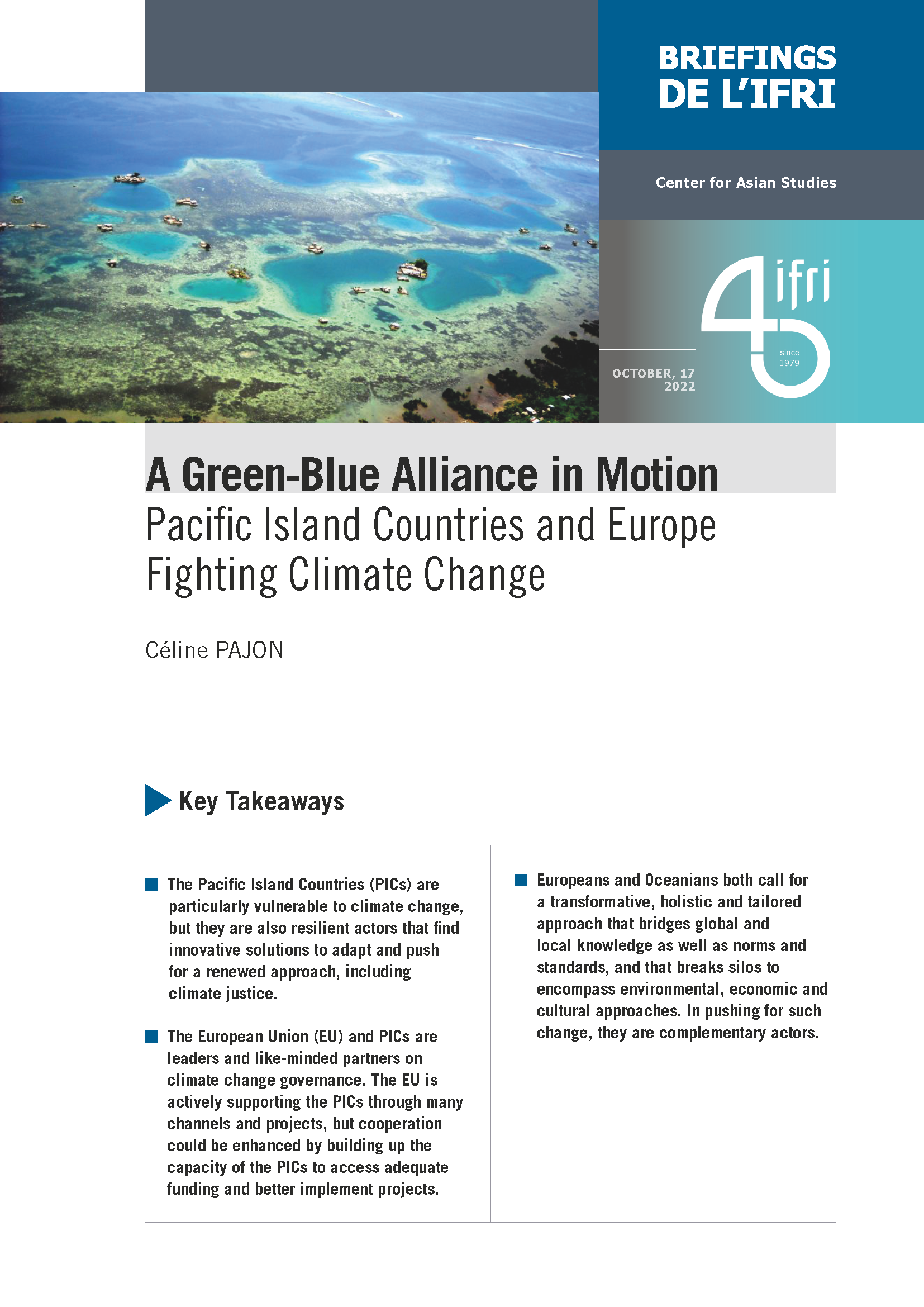A Green-Blue Alliance in Motion: Pacific Island Countries and Europe Fighting Climate Change

The Pacific Islands Countries (PICs) were the first to ratify the Paris climate agreement in 2015. Indeed, for them, climate change has had very concrete implications for years. Islanders have seen the sea level rising, endangering the very existence of atolls. They have also experienced increasingly violent cyclones and other natural disasters, and must deal with multiple impacts of a changing climate on their everyday lives
More than bearing the brunt of such impacts, and they have been calling for the rest of the world to awaken to this existential threat. At the recent UN General Assembly, the government of Vanuatu, supported by other states, led an initiative to ask for the opinion of the International Court of Justice on climate change.
The European Union (EU) has been a proactive leader in international negotiations on climate change; it strives to lead by example and do its share to mitigate climate impacts and support adaptation efforts. But it was perhaps on only this past summer that climate change began to feel very real for European public opinion, as the continent was ravaged by a series of heatwaves, major wildfires and droughts that had serious impacts on biodiversity, agriculture, but also human health. Some have said this is the “end of innocence” for the Europeans on climate change. This episode might help bridge the gap and make Europeans better understand what the populations of the Pacific Islands have been enduring, keeping in mind that PICs are more exposed and have fewer financial resources to implement solutions. It might also raise greater interest about the way Oceanians could adapt and provide innovative solutions.
This Briefing argues that climate change challenges require an innovative, transformative approach to deliver results on mitigation, adaptation, and compensation for loss and damage. Europe and Oceania are two leading actors that already have a fruitful record of cooperation, and are willing to step up their cooperation to lead this transition to a new model.
This paper is based on discussions that took place during the webinar “Climate Change: The Pacific Island Countries, seven years after the Paris Agreement” organized by Ifri’s Pacific Islands Program, in partnership with the Pacific Community, on September 20, 2022.4 Contributions from panelists will therefore be highlighted.
Download the full analysis
This page contains only a summary of our work. If you would like to have access to all the information from our research on the subject, you can download the full version in PDF format.
A Green-Blue Alliance in Motion: Pacific Island Countries and Europe Fighting Climate Change
Related centers and programs
Discover our other research centers and programsFind out more
Discover all our analysesJapan’s Takaichi Landslide: A New Face of Power
Prime Minister Sanae Takaichi has turned her exceptional popularity into a historic political victory. The snap elections of February 8 delivered an overwhelming majority for the Liberal Democratic Party (LDP), driven by strong support from young voters, drawn to her iconoclastic and dynamic image, and from conservative voters reassured by her vision of national assertiveness. This popularity lays the foundation for an ambitious strategy on both the domestic and international fronts.
The U.S. Policy Toward Taiwan Beyond Donald Trump: Mapping the American Stakeholders of U.S.-Taiwan Relations
Donald Trump’s return to the White House reintroduced acute uncertainty into the security commitment of the United States (U.S.) to Taiwan. Unlike President Joe Biden, who repeatedly stated the determination to defend Taiwan, President Trump refrains from commenting on the hypothetical U.S. response in the context of a cross-Strait crisis.

China’s Strategy Toward Pacific Island countries: Countering Taiwan and Western Influence
Over the past decade, China has deployed a diplomatic strategy toward the Pacific Island Countries (PICs). This strategy pursues two main objectives: countering Taiwan's diplomatic influence in the region and countering the influence of liberal democracies in what Beijing refers to as the "Global South."

Opening up the G7 to South Korea to Address Contemporary Global Challenges
The G7’s global influence has diminished as powers like China reshape international governance through initiatives such as BRICS and the Shanghai Cooperation Organisation (SCO). With the G7 now representing just 10 per cent of the world’s population and 28 per cent of global GDP, its relevance is increasingly questioned.











